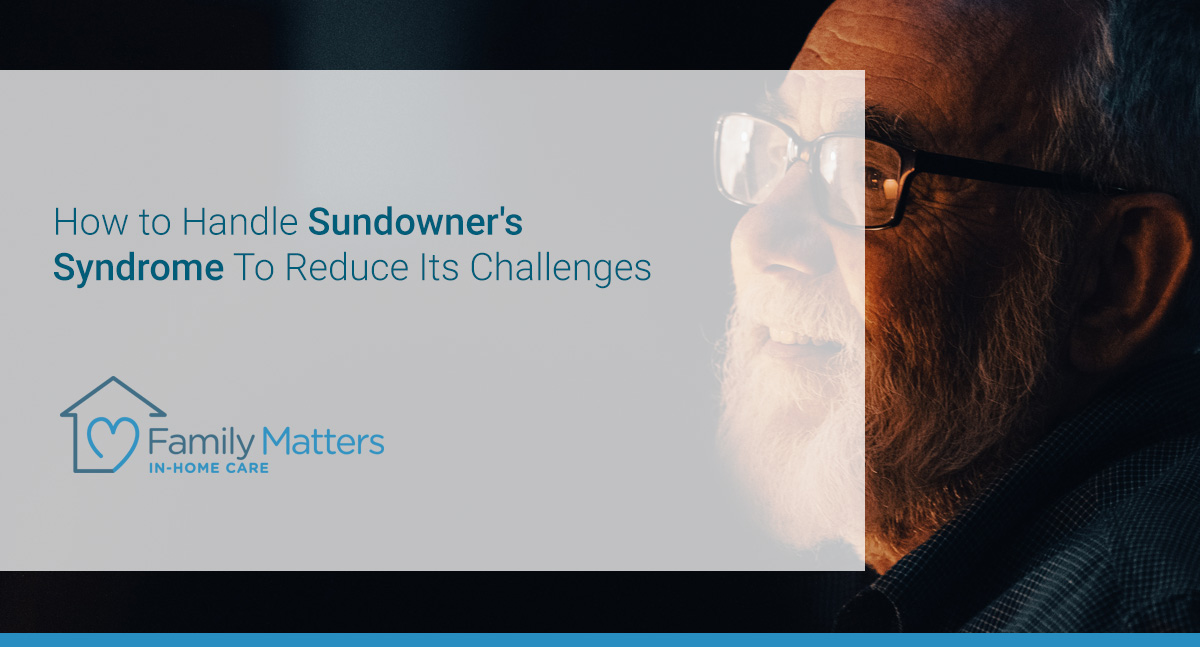
How to Handle Sundowner’s Syndrome To Reduce Its Challenges
Sundowners – it’s such a soft sounding word for a very challenging condition. Sundowning refers to an extreme state of confusion that often occurs during the late afternoon or evening for people with dementia or Alzheimer’s. It can manifest in a variety of concerning behaviors that include anxiety, aggression, paranoia, hallucinations, shouting, inability to follow directions, pacing, or wandering.
Up to 20 percent of adults with Alzheimer’s experience Sundowners Syndrome. Unfortunately, the exact cause isn’t known and there is no way to predict whether your senior will be affected by it. While the cause isn’t known, there are several avoidable factors that are known to aggravate it:
- Fatigue
- Low lighting
- Shadows
- A change in schedule
While your loved one may act aggressive, combative, and angry, it’s important to remember that, for many of our seniors, these emotions are based in a fear response and/or an intense feeling of needing to get away. It’s not a rational set of reactions but the emotions are real to them. Your empathy is key towards driving efforts to calm and reassure them, and can go a long way toward helping control your own frustrated reactions during this time. Neither of you asked for this.
Sundowning doesn’t reliably respond to medications or medical interventions. Many of the medications that might be tried have side effects that trigger alternate confusion or aggravation for your loved one. And, what triggers them now may not be what triggers or exacerbates it in the future.
How To Reduce the Challenges of Sundowning
You can help to reduce the challenges of sundowning through a multitude of holistic means:
- Maintain a predictable schedule, especially in the afternoon and evening.
- Increase the amount of daylight that your loved one is exposed to.
- Limit afternoon naps.
- Limit caffeine, sugar, and liquid during the late afternoon.
- Close curtains and turn on lights at sundown.
- Reduce the amount of activity, including TV, at night.
- If their confusion starts at the time of day that people are getting home from work and preparing dinner, try to decrease the chaos or move them to a quieter part of the house.
- Play soothing music or nature sounds.
- Take an evening walk.
- Utilize a night light in the room where they sleep.
- Avoid restraining your loved one or arguing with them when they are agitated. Pacing can help them work off the agitation. Reassurance, rather than argument, will help calm them.
- Sometimes the best solution is distraction. Offer your senior a favorite snack, beloved object, or change in activity. Even simple tasks like folding laundry can be used to distract and involve their brain in a less reactive way.
Since Sundowner’s does not always follow a predictable pattern, it is important to pay attention to potential triggers, as well as to which activities seem to soothe the confusion. Knowing your loved one’s triggers can potentially help you gift them with the internal tools to handle their own feelings of frustration and confusion.
If you or your family member is considering in-home care as part of a plan to age in place, contact Family Matters In-Home Care today for a free consultation. Our team is dedicated to supporting your family and helping older adults enjoy life in the comfort of their own home for as long as possible.
Some of the services offered by Family Matter In-Home Care include: Alzheimer’s & Dementia Care, Bed & Wheelchair Transfer Assistance, Companionship, Housekeeping & Meal Preparation, Personal Care, Recovery Care, and Transportation.
Serving the San Francisco Bay Area and Greater San Diego, Family Matter In-Home Care has offices throughout California including: Campbell, CA, Roseville, CA, San Marcos, CA, and San Mateo, CA.
Sources:
- https://f.hubspotusercontent30.net/hubfs/1708580/0122%20Sundowners.pdf
- https://www.medicalnewstoday.com/articles/324516#seeing-a-doctor
- https://www.mayoclinic.org/diseases-conditions/alzheimers-disease/expert-answers/sundowning/faq-20058511
- https://www.alz.org/help-support/caregiving/stages-behaviors/sleep-issues-sundowning
- https://www.aarp.org/caregiving/health/info-2017/ways-to-manage-sundown-syndrome.html
